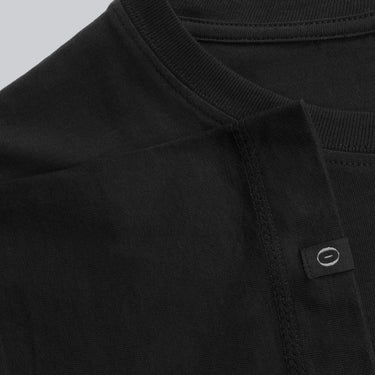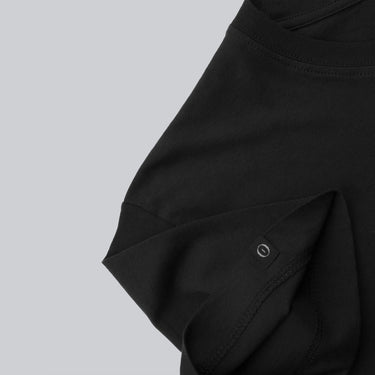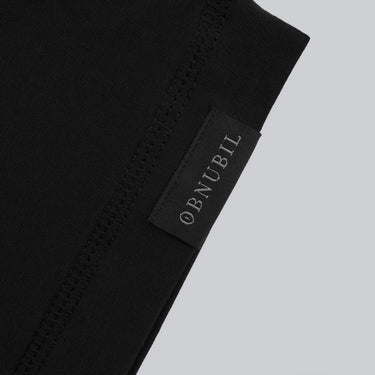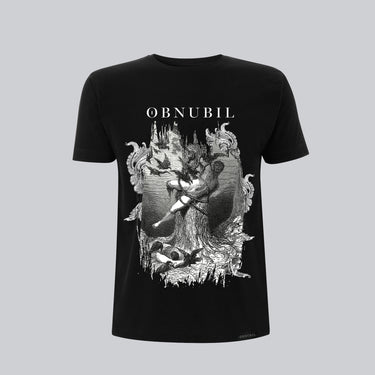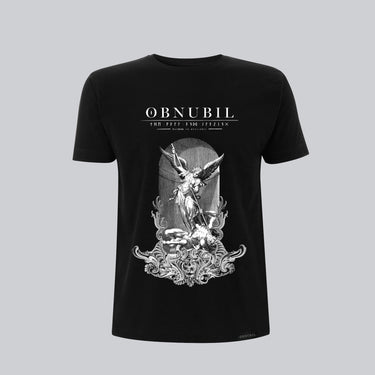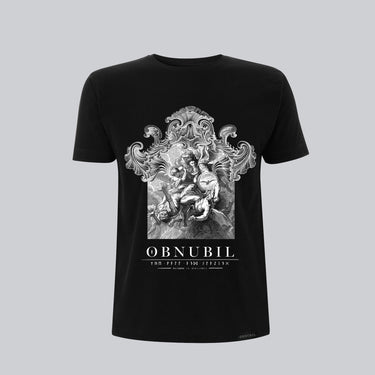
In the molten crucible where extreme music, atmosphere, and raw emotion collide, few drummers navigate the tension between brutality and nuance as fluently as Vincent Verstrepen, known for his work in Carnation, Predatory Void, and Velvet Mist. Over the course of this conversation, we peel back the curtain on his journey: moments of revelation, the tensions between speed and restraint, and the inner mechanics of how he balances multiple stylistic identities. We’ll explore how his early influences evolved into signature moves, how he adapts to wildly different band contexts, and what creative frontiers still excite him today. Whether you’re a drummer chasing tone, a fan chasing atmospheres, or someone curious about the visceral interplay of light and shadow in extreme music — this talk with Vincent offers a rare view into the mind of a drummer whose heartbeat lives in the margins between chaos and control.

INTERVIEW
OBNUBIL: Vincent, before we get into the heavy details of your work in Carnation, Predatory Void, and Velvet Mist — I want to start somewhere more personal. Away from the noise, the lights, and the intensity each of those bands demands from you, what’s been on your mind lately? Have there been quiet or unexpected moments that reminded you why you keep throwing yourself into these very different storms behind the kit, night after night?
Vincent: The short answer for throwing myself on this, time after time is simply the passion and love for the instrument and music in general. Everyone of us who knows the music scene/business, knows how hard it can get to achieve some momentum with their music but in the end it’s all about the pleasure we receive from doing it. This should be your first and most important reason for playing music.
OBNUBIL: Every drummer has that origin point — not just the day they picked up sticks, but the moment the idea of rhythm stopped being background noise and became something alive inside them. For you, was it a song, a show, or maybe even a single bar of music that made you think: “I don’t just want to hear this — I need to be the one driving it”? What’s the story of the first time you felt that pull toward becoming the engine of a band?
Vincent: It’s never really easy to pinpoint a certain moment where it all started for me. Since I play in a band with my brother and we both have had a strong feeling of playing music ourselves since childhood, I think we both inspired and pushed each other forward from a fairly young age. At a certain point we found an old guitar in the attic. We both were very interested in how to play it. But to be in a band as we saw it as children, you would need a drummer rather than having just a second guitar player. I took over that part and used just about anything that produced sound to imagine me playing a real drumkit. I think I might have been 4 by that time. My brother and I already recorded some silly songs on a cassette tape. Fun times!
OBNUBIL: Thinking back to your early days as a drummer, who were the musicians, bands, or drummers that truly inspired you and shaped your approach to the kit? If you had to pick your top three songs or drum performances that left a lasting impression and helped define the drummer you’ve become today, what would they be — and can you share what it was about each one that resonated with you so deeply?
Vincent: Very early on who inspired me the most was Mr. John Henry Bonham. His feel and personality behind the kit really caught my attention. This similar feeling i had when seeing Dave Grohl play drums. What these both drummers have in common is the way their sound and way of playing is so recognizable. When I grew a little older (around the age of 8) and started to listen to Metal, a new galaxy opened up for me. Drummers like Gene Hoglan, Dave Lombardo, Igor Cavalera, Dirk Verbeuren, Martin Axenrot truly inspired me as a metal drummer.
Here is my top 3:
-
-
-
- Death - Zero Tolerance
- Opeth - The Lotus Eater
- Led Zeppelin - The Song Remains The Same
-
-
OBNUBIL: In your early days as a drummer, were there habits — technical or mental — that you later had to completely “unlearn” because they were holding you back? What was the turning point that made you realize those habits had to go?
Vincent: One habit, and it’s something we all recognize is just the fact that we need to slow down. I still need to tell myself from time to time when learning something new, you have to trust the process and don’t think of achieving it in just one day.
OBNUBIL: In your opinion, what’s the single most overlooked technical skill in extreme metal drumming that actually separates a “fast drummer” from a “killer live drummer”? Was there a moment — maybe on a festival stage — where you realized you had that skill and it saved the set?
Vincent: In my opinion the single most overlooked skill of just about any drummer is personality and a recognizable style of playing. For some reason it is disappearing more and more and that’s very unfortunate. My main goal is to express myself and who I am and not just copy someone else.
OBNUBIL: I am sure you’ve toured in situations where gear, monitoring, and soundchecks were far from ideal — yet you still had to deliver a flawless performance to a packed audience. Can you recall a night where everything conspired against you as a drummer, but you still walked off stage thinking, “That was one of my best shows”? What made that happen despite the chaos?
Vincent: I can name you many more times but one that keeps in mind is when i was touring Asia with Skeletal Remains. One night we had to perform a show in Manilla, The Philippines. It was a one night festival in a Chinese restaurant. They threw out all the tables and made the space clear for some killer Metal bands that night. We had to open up because we still had to catch a flight to Taiwan a couple hours after. The drums and other gear only arrived 10min. before our set. It was a basic rock set-up. One rack tom, floor, bass drum and the thing was about to fall apart. Still, no time to stress out on that. I was actually very excited about being creative with that. So with that positive mindset and the adrenaline of playing with this very cool band in such a cool location, we just took off. It was great and lots of fun! It’s always about how you see things, that makes the real difference. You can complain all you want but that doesn’t bring you anywhere. I always try to find the positive sides of these situations and let me tell you, it makes it all a lot more fun!
OBNUBIL: Sometimes the most valuable lessons come from watching other drummers up close, especially on tour. Has there been a moment in a backstage or side-stage situation where you saw another drummer do something so simple yet so effective that it changed the way you play?
Vincent: Yes! I always try to make some time to watch other drummers and see how they approach the drums. What has been very thoughtful to me was watching Gene Hoglan perform and the way he is seated behind the kit and how important that actually is. Straight back and playing flawlessly, beautiful!
OBNUBIL: When you first joined Carnation, was there a specific song or passage that felt almost impossible for you to nail at the band’s intended live intensity — and if so, what did you do in your practice routine to make it not just playable, but second nature? And now, if you had to pick one Carnation song that best represents your personal “drumming autobiography” — a piece that contains your evolution from your first awkward practice sessions to your current technical maturity — which would it be, and what moments in that song directly trace back to your earliest drumming experiments?
Vincent: Things went fast when I first joined Carnation. We had one local show before a Japanese tour started. It had put a lot of pressure on me. That motivated me a lot. One song that was hard to nail back then was ‘Sermon of the Dead’. This song had a lot of tempo changes and some quite fast parts for me. The only way of nailing it is to repeat any mistake you make.
The song that might represent my playing the most might be ‘Iron Discipline’. The overall groove in this song is something inspired by Opeth / Bloodbath’s drummer Martin Axenrot. I really enjoy the way non-metal influences can be a part of our music.
OBNUBIL: Looking back at your drumming from your very first Carnation rehearsal to your most recent show, what’s the single biggest thing you wish you could go back and tell your past self — not about gear, but about mindset?
Vincent: Relax and believe in yourself!
OBNUBIL: Many drummers in death metal lean heavily on heel-up or swivel for speed, but you’ve got your own touch that mixes speed and articulation. Was there a pivotal gig or tour where you had to completely rethink your pedal technique because of fatigue, injury, or just bad backline gear — and how did that “disaster” influence the way you play now?
Vincent: My ‘technique’ was something that came up naturally. Sure, I'm not the fastest drummer. That isn’t my goal anyway! What has changed over the years are my pedal settings and sticks I use. Sometimes the worst things you come across are just the mindset you have and the fact of overthinking problems.
OBNUBIL: You also play in Predatory Void, where sound feels more spacious and textural than Carnation’s — almost like there’s more “air” between the notes, which can be more challenging than constant intensity. As a drummer, how do you approach filling those spaces without stepping on the atmosphere, and was it difficult at first to resist the instinct to “overplay”?
Vincent: At first it was challenging as this was a very different approach to me. For that reason it was interesting to start working on these songs. I think small articulations as ghost notes help the groove of the song without losing its atmosphere. I kinda knew the background of the other bandmembers, so with that in mind I could figure out what or what not to play, most of the time. I was very free to do what I felt with the music, also Lennart Bossu who so far wrote all the music brought in some amazing ideas!
OBNUBIL: Switching between Carnation and Predatory Void must be like switching between sprinting and controlled free-diving. Can you share a moment in rehearsal or live performance where your muscle memory from Carnation almost carried over into Predatory Void — and you had to stop yourself from going full death-metal mode?
Vincent: I think in the very beginning of Predatory Void, there had been moments in rehearsal or live shows where I was just playing the songs too fast, which took away the atmosphere of the music itself. This might have been that point as you mentioned. Still, when rehearsing these songs at home, I always use a clicktrack. It helps memorizing the tempos much better. After a while it becomes muscle memory.
OBNUBIL: The band’s music is deeply emotional and textural — there are parts where the drums almost act as a storyteller’s heartbeat. Has there been a live show with Predatory Void where you felt completely immersed in that narrative aspect, almost forgetting you were playing parts and instead just channeling the mood?
Vincent: This actually happens every time during the whole live-set. This music brings me into a certain flow and place that is meditative. It’s crazy!


OBNUBIL: Carnation demands constant forward drive, Predatory Void requires patience and space, and Velvet Mist, another band you play in, brings its own textures. Out of those three skill sets, which was the hardest for you to develop — and which still pushes you the most today? And when you compare the adrenaline of high-BPM Carnation songs with the meditative endurance of Predatory Void’s drawn-out passages, which proves more physically demanding over a full set, and do you prepare your body differently for each?
Vincent: All these three bands are so different from each other that they have their own difficult parts which aren’t comparable. Both Carnation & Predatory Void demand endurance, technique and dynamics. In Velvet Mist it is so different, first because I play an old school Simmons electronic drumkit, which feels very odd at first and the dynamics in this band are being focused on the cymbals because these are the only acoustic instruments for that setup.
OBNUBIL: You’ve managed to carve out a drumming voice that’s as precise as it is atmospheric, whether it’s in the full-force assault of Carnation, the oppressive weight of Predatory Void, or the textures of Velvet Mist. Right now, what’s fueling your creativity the most? Are there projects, tours, or recordings on the horizon that are pushing you into new technical or emotional territory — and should we be bracing for any unexpected moves from you in the near future?
Vincent: Right now I am focusing myself on developing my skill set in double bass and blastbeat endurance as well as learning from a couple books involving some Jazz material.
OBNUBIL: It’s been great pulling back the curtain on your journey! Before we wrap up, what would you like to say to the people who’ve been following your path — whether they’re die-hard fans of any of your bands, fellow drummers, or newcomers who just stumbled into your world? It could be words of thanks, a piece of advice, or even something completely unfiltered — what’s the note you’d like to leave this conversation on?
Vincent: To those who have been following my journey and supporting me over the years, I feel very thankful that you’ve been there for me. I feel honored to have been a part in your journey as well and hope that this talk has been helpful to anyone out there starting or seeking for inspiration. Last but not least I'd like to thank you for reaching out to me for this incredible interview.
Interview done September 2025. Photos by Unknown.



